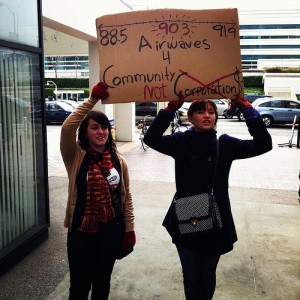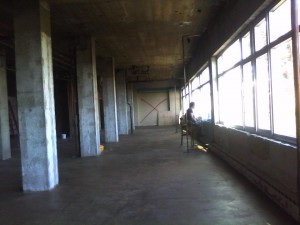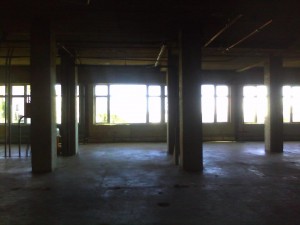January 18, 2012 marked the one year anniversary of the sudden shutdown of University of San Francisco’s (USF) college radio station KUSF.
Back in 2011, the hopeful buyers (Classical Public Radio Network aka CPRN) probably didn’t anticipate that 12 months later the sale would still be awaiting FCC approval.
Save KUSF volunteers continue to fight the proposed sale and were out in force on January 18 at a protest outside the headquarters for commercial radio conglomerate Entercom.
Upstairs, the formerly commercial KDFC was still broadcasting from Entercom’s studios, although under different ownership (CPRN) and on the non-commercial side of the dial using rented airspace from KUSF 90.3 FM and utilizing the one CPRN-owned station: KDFC 89.9 FM (which had the call letters KNDL before it was purchased by CPRN in 2011). KDFC was also marking its own one year anniversary of becoming listener-supported by facilitating the move of the KUSF transmitter from USF to Sausalito and by kicking off its first on-air fundraiser.
Behind the scenes, USF and CPRN were also quietly updating their asset purchase agreement in order to extend the official “Closing Date” for the KUSF sale for another six months from January 12, 2012 to July 12, 2012. Additionally, owing to the length of time that has elapsed since the original agreement, this recent amendment also contains a provision that “in consideration of the extension of the time for Closing under the Agreement,” CPRN was to pay USF $100,000 by January 31, 2012.
In his one year anniversary update on KDFC.com, KDFC’s President Bill Lueth shared the news of the transmitter move, saying,
“The signal for 90.3 has been moved from the University of San Francisco campus (the current license holder of the signal) to a hill above Sausalito. The signal is in a testing phase. This will improve coverage from Northern Marin to SFO, and along the same latitudes in the East Bay on the west side of the hills from El Cerrito to Oakland, and possibly further south. Line of site constraints and building penetration issues may cause continued reception problems in some areas, but generally this new antenna location should be a vast improvement for many in the coverage area of this signal. We continue to look for solutions for improved coverage for areas still not covered by our current signals. Thanks for your patience and support.”
According to CPRN’s Managing Director Brenda Barnes, since they’ve been busy with the fundraiser, they haven’t yet had an opportunity to fully assess how the transmitter move has affected coverage. She also explained to me that the January 19th-27th on-air pledge drive was only occurring over CPRN-owned 89.9 FM, saying, “We are fundraising only on KDFC and the webstream, not on the stations we do not yet own (KUSF and the Los Gatos translator).” With increased FCC scrutiny of the deal to purchase KUSF, CPRN/KDFC is clearly taking care to comply with FCC regulations related to third-party fundraising. When I spoke with Barnes last week it was in the middle of the fundraiser and Barnes was enthusiastic about how it was going, saying, “The first membership drive on KDFC is going very well and we remain determined to preserve classical radio for the Bay Area.”
The week prior, at the Save KUSF protest at Entercom, Barnes actually spent nearly an hour chatting with KUSF supporters. She explained, “I was not at the protest but a few members of the Friends of KUSF came up to the station and we talked there for awhile, then building security came and asked us to leave. We then went outside and talked more. We talked for about an hour and I found it very helpful. I offered to talk again anytime and to help them with fundraising.”
Audio from that conversation between Barnes and various Save KUSF representatives can be heard on the San Francisco Bay Independent Media Center website. During the discussion Barnes says repeatedly that she supports community and college radio. Early on she tells Save KUSF’s Irwin Swirnoff, “I believe in what you’re doing and I’m not an enemy by any stretch of the imagination.” She acknowledged that University of Southern California (USC, which is 90% owner of CPRN) was providing funding for the purchase of KUSF and pointed out that USC is interested in having a a “tangible presence” in the San Francisco Bay Area in order to connect with alumni and potential students.
Swirnoff grilled Barnes about the details surrounding USF’s alleged “premature” transfer of control of KUSF, pointing out that the studio was destroyed and that KUSF’s chief operator Michael Bloch seemed to not understand where KUSF was broadcasting from.
Swirnoff also said that Bloch had “stepped down” and Barnes added that, “Michael is going on sabbatical.” Sources at USF tell me that the new Chief Operator of KUSF-FM, as of January 23, is USF Associate Dean for Sciences Chris Brooks. Unlike Bloch, Brooks has some radio experience, having been a DJ and Production Director at college radio station WCBN while he was a graduate student at University of Michigan. I tried to reach both Bloch and Brooks and had not received a response at press time.
During her conversation with Swirnoff and other Save KUSF supporters, Barnes also pointed out that she knew that there would be protests against the KUSF sale and that she’d been upfront with USF about that. She repeated that she wished that they didn’t have to compete for the airwaves, but was also clear that CPRN had the right to purchase a station that was for sale, saying, “USF owns the station. It’s their station…and they had a right to sell it…”
In probably the most revealing part of the conversation, Barnes shared some information about CPRN’s attempt to purchase KUSF several years ago. She explained that she had encouraged KUSF General Manager Steve Runyon to work on KUSF’s relationship with USF in order to prevent the station from being sold in the future. According to Barnes, “There was a process before this…5 years ago…we were the ones that tried to buy it…I sat down myself with the university and said…this is a long-standing service…this is not going to be an easy endeavor to sell the station and you’ve got to really…be sure that this is what you want to do.”
Ultimately USF decided to not sell KUSF at the time and news of the thwarted sale was leaked to local press. According to a December, 2006 article in the SF Weekly, “The story was first reported back in October by Radio Alice personality Hooman, who claimed on the air that he had heard from a reliable source that University of San Francisco President Rev. Stephen Privett was angling to sell the station to a public radio interest.” After the sale fell through Barnes said,
“I sat down with [KUSF General Manager] Steve Runyon… and I said you have an opportunity here to do something different and to forge a different relationship with the university so that this doesn’t happen again, but you’ve got to do something different…obviously they’re not feeling solid about the station…It’s their station. They own it. You don’t own it…you have an opportunity…So I sat down with Steve and I tried really hard to talk to him and say you really have to do something different here. You dodged a bullet. This station’s important. You’ve been here a long time. You need to do something different. So I just want you to know, that I really tried and I did have that conversation with him. And I really encouraged him to try to lobby, pull everyone together and forge a different relationship with the university so it wouldn’t happen again.”
When I spoke with Runyon today, he told me that when Barnes stopped by KUSF five years ago she’d been impressed with the station. He added, “She told me that we were a treasure that the university should support.” Runyon said that Barnes told him that she’d passed along that advice to Father Privett as well. Additionally, Runyon explained that they did “take to heart” improving the station’s relationship with the college and pointed out that Barnes doesn’t know the details of what they did and didn’t do to forge those ties. He said, “I’ve always been really proud of the stuff we did [at KUSF].” He cited the station’s commitment to “social justice programming,” its range of shows in different languages, and its connection to the city of San Francisco. He went on to explain that both students and faculty were active participants at the station over the years. He did add, however, that “morale was never the same” after the rumored sale five years ago.
Barnes said that after several years elapsed, KUSF was back on the market. She said, “Then when the station came on the market again a year ago, a year and half ago or whatever…the university had decided this time…they were done, that other relationship hadn’t been forged…and so, what do you do…it’s not like I haven’t tried…haven’t respected it…when push comes to shove, the university has the right to sell it…it’s now in the FCC’s hands…we’ll have to see how it turns out.”
As has been the case at other stations, the ins and outs of preventing a station sale are complex. As we can see with KUSF, the fight to save the station has been years in the making and in many ways this serves as a cautionary tale to other stations that have seen warning signs like KUSF did.
USF Media Studies Professor Dorothy Kidd has been a vocal opponent of the KUSF sale and in reflecting back on 2011 she said, “What I learned this year is how valuable KUSF had been for students, the San Francisco community and especially for musicians, music-lovers and artists of all kinds. Even more so, it renewed my love and support for radio, a commons resource that is still really needed by local communities, students, educators and citizens across the U.S.”
While USF officials await news from the FCC about the KUSF sale, the future of the promised-for online-only student radio station remains in limbo. The old KUSF studios were dismantled months ago and Phelan Hall construction is proceeding to make way for student housing. A few weeks back an old piece of KUSF equipment even showed up on eBay. The two remaining KUSF.org staff members have been moved across campus to a small office and a proper broadcasting studio has yet to be built.
USF students interested in volunteering and gaining experience at a campus radio station are left with few options other than shuttling across town to KUSF in Exile, which is being operated by former KUSF volunteers. Kidd said, “There is no operating KUSF right now. Many students are disappointed as are faculty and staff. I continue to hope that we can learn from this crisis and build a better service for students, the university and the city.”
Swirnoff said that he remains energized about the fight to save the frequency. He said, “I feel really excited about the continued commitment from the community.” Swirnoff also said that the combination of both legal efforts and public protests have been effective methods to raise awareness about the situation at KUSF. He is optimistic about the future actions of the FCC, saying, “I have hope that public hearings could happen.”





